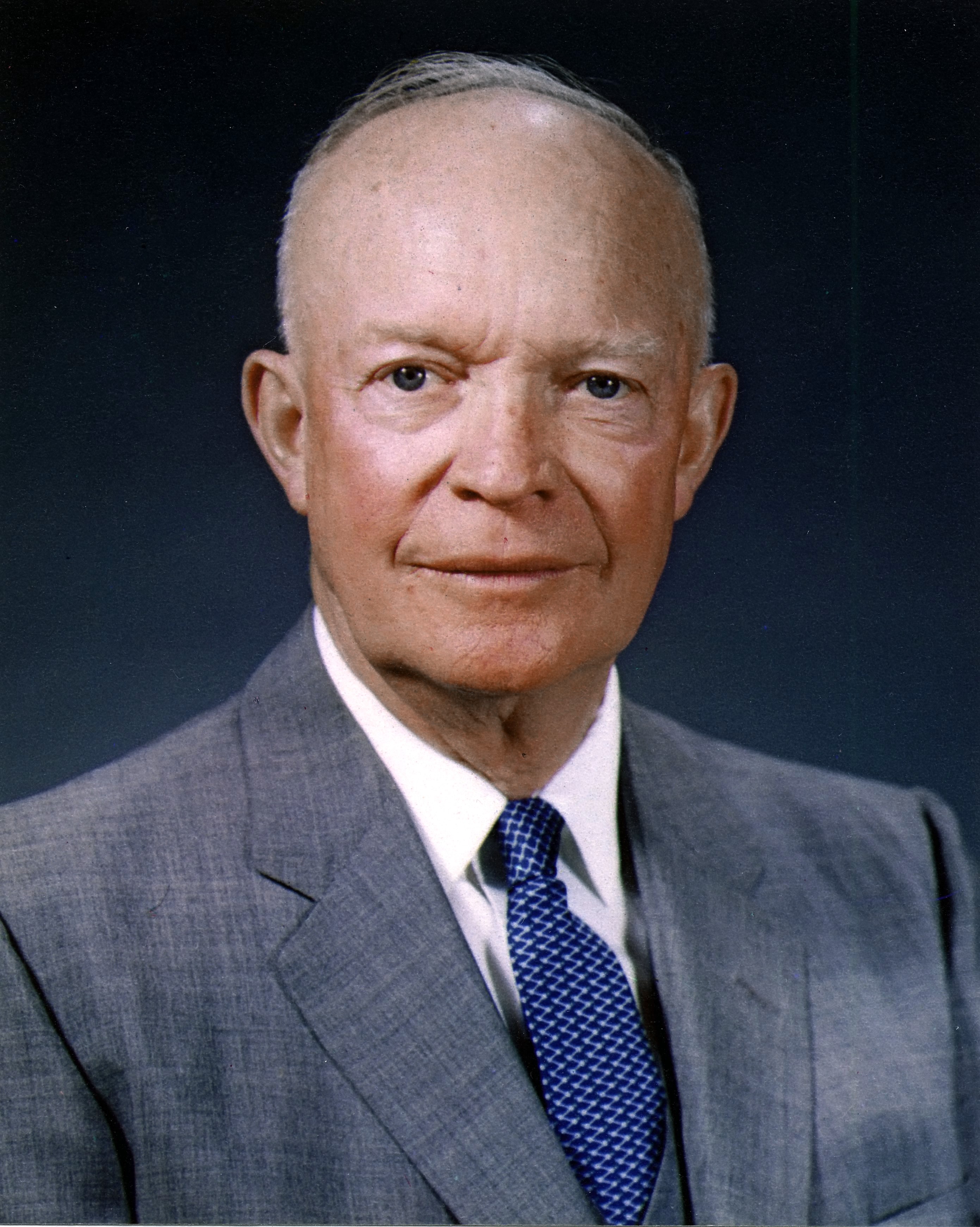Aus der Abschiedsrede des U. S. A. Präsidenten, Dwight D. Eisenhower, gehalten am 17. Januar 1961 und in den U. S. A. im Fernsehen übertragen. "http://de.wikipedia.org/wiki/Milit%C3%A4risch-industrieller_Komplex" und vollständige Rede "http://en.wikisource.org/wiki/Eisenhower%27s_farewell_address
Dwight David Eisenhower Berühmte Zitate
Letzte Worte, 28. März 1969
Original engl.: "I've always loved my wife, my children, and my grandchildren, and I've always loved my country. I want to go. God, take me."
Dwight David Eisenhower: Zitate auf Englisch
Remarks at Fourth Annual Republican Women's National Conference (6 March 1956) http://www.presidency.ucsb.edu/ws/?pid=10746
1950s
"Remarks at the Birthplace of Abraham Lincoln" http://www.eisenhowermemorial.org/speeches/19540423%20Remarks%20at%20the%20Birthplace%20of%20Abraham%20Lincoln.htm, Hodgenville, Kentucky (April 23, 1954). The story originates http://books.google.com/books?id=AsrfAAAAMAAJ&pg=PA128 from F. A. Mitchel, son and aide of General Mitchel.
1950s
“If civilization is to survive, it must choose the rule of law.”
Presidential Statement on the Observation of Law Day http://www.eisenhower.archives.gov/education/bsa/citizenship_merit_badge/speeches/address_convention_hall.pdf (30 April 1958)
1950s
Answer to question seeking his views on limiting U.S. presidents to two terms, news conference, Washington, D.C. (October 5, 1956), in Public Papers of the Presidents of the United States: Dwight D. Eisenhower, 1956, p. 862.
1950s
“There is one thing about being President — nobody can tell you when to sit down.”
As quoted in"Sayings of the Week" in The Observer (9 August 1953), and The MacMillan Dictionary of Quotations (1989) by John Daintith, Hazel Egerton, Rosalind Ferguson, Anne Stibbs and Edmund Wright, p. 447
1950s
“Biggest damfool mistake I ever made.”
Referring to his appointment of Earl Warren as Chief Justice of the Supreme Court; reported in Fred Rodell, "The Complexities of Mr. Justice Fortas", The New York Times Magazine (July 28, 1968), p. 12. William B. Ewald, Jr., research assistant for Eisenhower's memoirs, says in Eisenhower the President, p. 95 (1981), "I myself once, and once only, heard him say in Gettysburg in 1961, 'The two worst appointments I ever made came out of recommendations from the Justice Department: that fellow who headed the Antitrust Division, Bicks, and Earl Warren'".
Disputed
1960s, Farewell address (1961)
“If a problem cannot be solved, enlarge it.”
As quoted in Baseball's Greatest Quotes (1992) by Paul Dickson; cited in "Game Day in the Majors" at the Library of Congress http://memory.loc.gov/ammem/collections/robinson/jrgmday.html
Annual Message to the Congress on the State of the Union http://www.eisenhower.archives.gov/all_about_ike/quotes.html (2 February 1953)
1950s, Annual Message to Congress (1953)
“A foundation of our American way of life is our national respect for law.”
1950s, Address to the American People on the Situation in Little Rock (1957)
Speech http://books.google.com/books?id=cF9AE1zYRkwC&q="Humility+must+always+be+the+portion+of+any+man+who+receives+acclaim+earned+in+blood+of+his+followers+and+sacrifices+of+his+friends"&pg=PA223#v=onepage at Guildhall, London (12 June 1945)
1940s
“The free individual has been justified as his own master; the state as his servant.”
Commencement Address at Columbia University http://www.eisenhower.archives.gov/education/bsa/citizenship_merit_badge/eisenhower_citizenship_quotations.pdf (1 June 1949)
1940s
1950s, Address at the Philadelphia Convention Hall (1956)
As quoted in Baseball's Greatest Quotes (1992) by Paul Dickson; cited in "Game Day in the Majors" at the Library of Congress http://memory.loc.gov/ammem/collections/robinson/jrgmday.html
1950s, Atoms for Peace (1953)
July 27, 1960 Remarks at the Republican National Committee Breakfast, Morrison Hotel, Chicago, Illinois http://www.presidency.ucsb.edu/ws/?pid=11891#ixzz1fU73Watz
1960s
Signing into law the phrase "One nation under God" into the Pledge of Allegiance http://www.presidency.ucsb.edu/ws/?pid=9920 (14 June 1954)
1950s
“I do have one instruction for you, General. Do something about that damned football team.”
Said to William Westmoreland in 1960 when Westmoreland assumed the post of Superintendent of West Point.
Cited in [Atkinson, Rick, The Long Gray Line, First Pocket Books printing, 1991, Simon & Schuster, New York, ISBN 0-671-72674-9, p. 79, Year of the Tiger]
1950s
1950s, Second Inaugural Address (1957)
1960s, Farewell address (1961)
The White House Years: Mandate for Change: 1953–1956: A Personal Account (1963); longer passage http://www.chss.montclair.edu/english/furr/ike1.html quoted at Montclair State University
1960s
“Democracy is essentially a political system that recognizes the equality of humans before the law.”
Address to Constituent Assembly, Rio de Janeiro, Brazil http://www.eisenhower.archives.gov/education/bsa/citizenship_merit_badge/eisenhower_citizenship_quotations.pdf (8 August 1946)
1940s
The Secretary was deeply perturbed by my attitude...
The White House Years: Mandate for Change: 1953–1956: A Personal Account (1963), pp. 312-313
1960s
Presidential news conference http://www.eisenhower.archives.gov/all_about_ike/quotes.html (26 March 1958)
1950s
As quoted in "What Americans forget about French resistance" http://www.cnn.com/2015/05/06/opinions/kaiser-ve-day-french-resistance/index.html (7 May 2015), by Charles Kaiser, Cable News Network, Atlanta, Georgia.
1950s, Address at the Philadelphia Convention Hall (1956)
Eisenhowers proposal for the establishment of the International Atomic Energy Agency
1950s, Atoms for Peace (1953)
1950s, Address at the Philadelphia Convention Hall (1956)
On his stated opposition to the use of the atomic bomb against the Japanese at the end of World War II, as quoted in Newsweek (11 November 1963), p. 107
1960s
